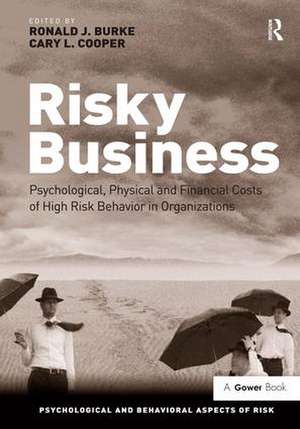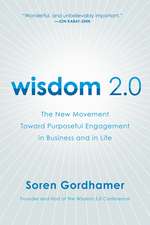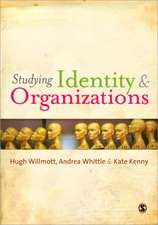Risky Business: Psychological, Physical and Financial Costs of High Risk Behavior in Organizations: Psychological and Behavioural Aspects of Risk
Autor Cary L. Cooper Editat de Ronald J. Burkeen Limba Engleză Hardback – 28 aug 2010
Preț: 832.97 lei
Preț vechi: 1110.43 lei
-25% Nou
Puncte Express: 1249
Preț estimativ în valută:
159.39€ • 166.09$ • 131.97£
159.39€ • 166.09$ • 131.97£
Carte tipărită la comandă
Livrare economică 03-17 aprilie
Preluare comenzi: 021 569.72.76
Specificații
ISBN-13: 9780566089152
ISBN-10: 0566089157
Pagini: 482
Dimensiuni: 174 x 246 x 38 mm
Greutate: 1.18 kg
Ediția:1
Editura: Taylor & Francis
Colecția Routledge
Seria Psychological and Behavioural Aspects of Risk
Locul publicării:Oxford, United Kingdom
ISBN-10: 0566089157
Pagini: 482
Dimensiuni: 174 x 246 x 38 mm
Greutate: 1.18 kg
Ediția:1
Editura: Taylor & Francis
Colecția Routledge
Seria Psychological and Behavioural Aspects of Risk
Locul publicării:Oxford, United Kingdom
Cuprins
Contents: Part I Introduction: Human frailties and toxic organizations, Ronald J. Burke. Part II Human Frailties: Work hours, work intensity and work addiction: weighing the costs, Ronald J. Burke; Understanding and treating workaholism: setting the stage for successful interventions, Corine I. van Wijhe, Wilmar B. Schaufeli and Maria C.W. Peeters; Dangerous concoctions: alcohol, employment and the family, Paul M. Roman and Lauren A. O'Brien; Case studies on substance abuse in the workplace, Victor Adebowale CBEand Sarah Reed. Part III Toxic Organizations: Discrimination as high risk behavior in the workplace, Robert L. Dipboye; Psychologically intimate, romantic, and sexually intimate relationships in the workplace, Ronald J. Burke; Sexual harassment in the workplace, Vicki J. Magley, Timothy J. Bauerle and Benjamin M. Walsh; Job demands, resources and psychological and physical well-being: critical factors which may make some jobs more stressful than others, Susan Cartwright; Tragic duty, Ronald J. Burke; The nature and outcomes of destructive leadership behavior in organizations, Ståle Einarsen, Merethe Schanke Aasland and Anders Skogstad; Bullying in the workplace, Lars Glasø, Tina Løkke Vie and Helge Hoel; Workplace violence: the American experience, Richard V. Denenberg and Tia Schneider Denenberg; Managing the risk of workplace accidents, Sharon Clarke; Biting the hand that feeds: the employee theft epidemic –a human face on theft, Terrence Daryl Shulman; Index.
Notă biografică
Ronald J. Burke earned his PhD from the University of Michigan and is Professor Emeritus of Organizational Behavior. One of Canada's most prolific researchers, Professor Burke's work has focused on the relationship between the work environment and individual and organizational health. He was the Founding Editor of the Canadian Journal of Administrative Sciences and has served on the editorial boards of more than a dozen journals. He has served as Director of the PhD Programme at Schulich, and as Associate Dean for Research. He has participated in research conferences in North and South America, the UK, Europe, Asia and Australia. He has published over 500 journal articles and edited or co-edited 27 books with a variety of publishers. He has participated in over 300 management development programs as well as serving as a consultant on organizational effectiveness issues for private and public sector organizations. His views on management and organizations have also appeared in various media. Cary L. Cooper, CBE, is Distinguished Professor of Organizational Psychology and Health, Lancaster University Management School at Lancaster University, England. He is the author of over 100 books and 400 scholarly articles, and is a frequent contributor to national newspapers, TV and radio. He is currently Founding Editor of the Journal of Organizational Behavior and Editor in Chief of the medical journal Stress & Health. He is past President of the British Academy of Management, is a Companion of the Chartered Management Institute and one of the first UK based Fellows of the (American) Academy of Management. Professor Cooper is also the President of the Institute of Welfare Officers, President of ISMA, President of the British Association of Counselling and Psychotherapy, President of RELATE and Chair of the Academy of Social Sciences. In 2001, Cary was awarded a CBE by the Queen in the Queen's Birthday Honours List for his contribution to organizational health.
Recenzii
'...Risky Business delves into these murky, twisted, can-of-worms difficult topics, by investigating the psychological, behavioural, and social dimensions of high-risk behaviours by individuals and groups in organizations. Every year we read in the newspapers about 'cases' - where employee behaviour causes immeasurable damage to organizations...Risky Business - aptly-named, tells you how and why this type of event happens: how to spot the symptoms of employee disenchantment, unrest, unhappiness, dysfunction, and so on, and how to ensure that it doesn't happen to you, and your organization! Buy it, read it, and learn! You won't want to put it down!' - Professor Janice Langan-Fox, Swinburne University of Technology, Australia. 'Hardly anyone disagrees that its people are an organization’s most valuable asset. They embody a company’s potential and are rightfully credited for its successes. People can be clever, strong, creative and resilient. But its people also are a company’s most significant risk. Not only can their talents be squandered, they have the potential to permanently damage or destroy an organization. People can be greedy, unethical, and ignorant, as well as narcissistic, malicious, and vulnerable. Risky Business does a huge service by drawing attention to these and other behaviors that can threaten an organization’s future. For academics, the book provides a comprehensive review and analyses of the nature and consequences of a variety of high-risk behaviors in organizations. For practitioners, the book emphasizes solutions and tools to manage behavioral risks and avoid toxic environments.' - Bella L. Galperin, John H. Sykes College of Business, University of Tampa, USA 'Burke and Cooper have put together a very impressive book. The theme is very relevant and will attract many readers. They have invited some top experts to help them in the collection and the result is impressive. They also discuss subthemes that are in the intersection
Descriere
Risky Business provides a perspective on addictive behaviors such as gambling, drug taking and even addiction to work; criminal behaviors such as theft and corruption; and behaviors such as aggression and violence. The authors then look at their implications to employee and organizational health within the context of the workplace environment. It is an essential guide for occupational psychologists, human resource specialists, risk managers and for researchers in this field.





















